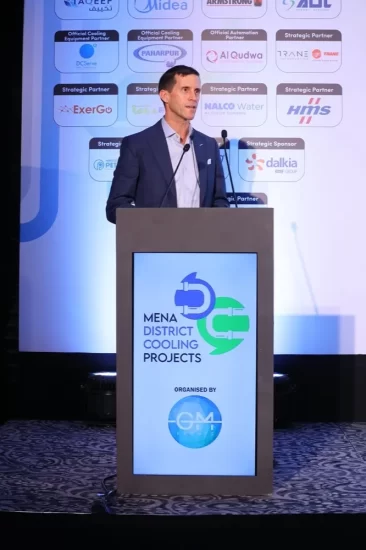New regulations will bring clarity on tariffs, establish transparency and accountability in the district cooling sector, officials say
Date: Dubai, June 15, 2022
A new suite of district cooling regulations aimed at reducing excessive billings and other issues is nearing completion, a senior government official said at the two-day MENA District Cooling Projects Conference that started on June 14, 2022, at Hotel Raffles Dubai, UAE.
“The grace period for the district cooling service providers and billing agents will expire on September 30, 2022, when the new comprehensive set of District Cooling Regulations comes into effect. Following this, we will supervise and monitor the activities of the district cooling companies to ensure compliance with the issued regulations,” James Grinnell, Head of Water at the Regulatory and Supervisory Bureau (RSB) for the Electricity and Water Sector in Dubai, said.
In permitting companies, the RSB has ensured last year’s reductions to the fuel-surcharge are being passed through to customers by Billing Agents. It also aims to ensure only one deposit will be allowed per unit – either from landlord or tenant, prohibit prolonged estimated billing, fast replacement of faulty meters.
“As per the new regulations, district cooling permit holders have obligations to develop and publish a customer charter and measure performance against it, clear engagement obligations when dealing with customers in arrears, obligation to deliver chilled water, prompt return of deposits, reduce occurrence of excess contract capacity estimates; penalties for poor energy performance, obligation to monitor and report health and safety, etc,” he said.

These new sets of regulations will bring increased transparency and establish stakeholder accountability to make the district cooling sector more efficient and customer centric. Customers must see that district cooling offer good value for money.
RSB was established in 2010 by Dubai Government to regulate Dubai’s power and water sector. It was mandated to regulate the Independent Water and Power Producers (IWPP) in 2011, and has supported Dubai’s Demand-Side Management (DSM) since 2013. Last year it received mandate to regulate the district cooling sector as per the Executive Council Resolution No. 6 of 2021.
RSB has so far issued 22 district cooling permits out of 24 applications among 28 companies. Among the billing agents, it has licensed 11 out of 12 applications and 11 service providers out of 12 applications.
“Following the mandate, we started to talk to all the stakeholders in the district cooling industry, and over the last year, have developed a set of regulations to implement the regulatory framework. The new regulations come into effect on September 30, 2022, when the grace period for the operators expires,” Grinnell says.
Other governments in the Middle East are also putting the regulatory regimes to ensure structured growth of the district cooling industry. Governments of Abu Dhabi, Saudi Arabia have been working on regulations over the last few years
Leila Noubough Nasr, District Cooling Regulation Senior Specialist at Abu Dhabi Department of Energy, said, the government has put a sound regulatory environment for the district cooling sector in the emirate. “We have so far issued four licenses with 230,000 RT licensed capacity in the emirate. One of the key achievements has been reduced consumption charge for the residential end-users.”

More than 250 delegates including senior government officials, project owners, developers, utility suppliers, industry experts and key stakeholders participated at the MENA District Cooling Projects Conference that focused on the growth of this important sector.
The two-day event discussed project opportunities worth US$15 billion (Dh55 billion), or 10 percent of the US$150 billion global district cooling market. The conference takes place at a time when the district cooling sector is expanding at a fast pace in the UAE, GCC and the rest of the Middle East and North Africa due to a global target of zero net emission by 2050.
At the MENA District Cooling Projects Conference, more than 25 international and regional experts discussed the current market outlook, opportunities and challenges in the region’s district cooling industry – that is becoming more popular due to its energy efficiency. More than 20 leading organisations from 10 countries are showcasing their products and services at the conference through an exhibition.
With the net zero emission target announced by the international community by 2050, most countries in the Middle East are now racing to install new district cooling plants to reduce their carbon emissions. Following the footsteps of the UAE, Saudi Arabia, Bahrain, Qatar, Oman, Kuwait, Egypt and other countries are initiating a large number of district cooling projects across the region – that will keep the contractors and subcontractors busy for the next 15-20 years, experts said.
District cooling systems use 50 percent less energy than air conditioners, thereby decreasing initial capital investment and maintenance costs. The equipment can operate smoothly for up to a 30-year span, enhancing technology adoption. District cooling adds enormous value in terms of improving building space utilisation, reducing noise pollution, reducing refrigerant use and most importantly reducing the cost of cooling substantially.
District cooling is, by far, the most energy-efficient way to cool buildings in arid environments. High reliability and increased energy efficiency are a few of the paramount features offered by district cooling systems which will boost the business trends. It is ideal for large establishments such as airports, commercial buildings, university campuses, and residential towers. The technology relies on a centralised cooling plant, which facilitates cooling within its grid through a network of the underground piping system carrying chilled water.
The event is being attended by officials of civic bodies such as municipalities, utility providers, utility operators, contractors, sub-contractors, materials suppliers, consultants, engineers, regulatory bodies and developers, etc. Participants at the conference are provided with enormous networking and business opportunities, many have secured businesses around the latest projects that are currently in early stage of execution.
The speakers for the event comprised high-profile industry leaders including Leila Noubough Nasr, District Cooling Regulation Senior Specialist, Department of Energy, James Grinnell, Head of Water, Regulatory and Supervisory Bureau for Electricity and Water of Dubai (RSB), Suliman Al-Khliwi, Managing Director, Saudi Tabreed Abobaker Al Hadrami, General Manager (LCCSO)/ O&M Director, Marafeq Qatar, Ezzeddine Jradi, Chief Transformation and Business Excellence Officer, Emicool, Fares Ahmad, General Manager, Emaar District Cooling and many other industry leaders.
About MENA District Cooling Projects Conference
District cooling has emerged as a major energy efficient utility sector preferred by the governments of the Gulf countries – in which the UAE is playing a leadership role. The MENA region plays a key role in curbing climate change and contributing towards the global efforts to reduce carbon emissions.
Cooling is an energy-intensive and non-stop activity in arid environments, and district cooling provides a major energy saving. This benefit is being realised in new and upcoming mega cities in the region, where district cooling has set a strong foothold. Nearly 650GWh of electricity savings has been recorded by the use of district cooling in Dubai alone in 2020.
While district cooling has proven to be the most energy-efficient cooling solution, there are several new methods and improvements to decrease its carbon footprint and reduce the usage of potable water, hence boosting sustainability.
The MENA region is witnessing rapid growth in cities and communities, raising the number of upcoming district cooling projects, as well as the need for upgrading existing plants with energy retrofits. Furthermore, district cooling operators are in a continuous pursuit to streamline their processes to facilitate efficient growth, profitability, and progress. The district cooling market in the Middle East is projected to reach US$15 billion by 2027.
In light of these developments, the Great Minds Event Management is hosting MENA District Cooling Projects, an exclusive forum gathering all the region’s key district cooling stakeholders to discuss crucial areas including modernisation, digital transformation

